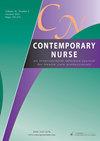Perspectives on the implementation of health informatics curricula frameworks.
IF 1.2
4区 医学
Q3 NURSING
引用次数: 0
Abstract
BACKGROUND The COVID-19 pandemic highlighted the necessity of equipping health professionals with knowledge and skills to effectively use digital technology for healthcare delivery. However, questions persist about the best approach to effectively educate future health professionals for this. A workshop at the 15th Nursing Informatics International Congress explored this issue. OBJECTIVE To report findings from an international participatory workshop exploring pre-registration informatics implementation experiences. METHODS A virtual workshop was held using whole and small group interactive methods aiming to 1) showcase international examples of incorporating health informatics into pre-registration education; 2) highlight essential elements and considerations for integrating health informatics into curricula; 3) identify integration models of health informatics; 4) identify core learning objectives, resources, and faculty capabilities for teaching informatics; and 5) propose curriculum evaluation strategies. The facilitators' recorded data and written notes were content analysed. RESULTS Fourteen participants represented seven countries and a range of educational experiences. Four themes emerged: 1) Design: scaffolding digital health and technology capabilities; 2) Development: interprofessional experience of and engagement with digital health technology capabilities; 3) implementation strategies; and 4) Evaluation: multifaceted, multi-stakeholder evaluation of curricula. These themes were used to propose an implementation framework. DISCUSSION Workshop findings emphasise global challenges in integrating health informatics into curricula. While course development approaches may appear linear, the learner-centred implementation framework based on workshop findings, advocates for a more cyclical approach. Iterative evaluation involving stakeholders, such as health services, will ensure that health professional education is progressive and innovative. CONCLUSIONS The proposed implementation framework serves as a roadmap for successful health informatics implementation into health professional curricula. Prioritising engagement with health services and digital health industry is essential to ensure the relevance of implemented informatics curricula for the future workforce, acknowledging the variability in placement experiences and their influence on informatics exposure, experience, and learning.关于实施卫生信息学课程框架的观点。
背景 COVID-19 大流行凸显了让医疗专业人员掌握有效使用数字技术提供医疗服务的知识和技能的必要性。然而,关于有效教育未来卫生专业人员的最佳方法仍存在疑问。第 15 届国际护理信息学大会上的一次研讨会对这一问题进行了探讨。目的报告一次探讨注册前信息学实施经验的国际参与式研讨会的结果。方法采用全体和小组互动的方法举办了一次虚拟研讨会,旨在:1)展示将健康信息学纳入注册前教育的国际范例;2)强调将健康信息学纳入课程的基本要素和注意事项;3)确定健康信息学的整合模式;4)确定信息学教学的核心学习目标、资源和教师能力;5)提出课程评估策略。对主持人记录的数据和书面笔记进行了内容分析。他们提出了四个主题:1)设计:为数字健康和技术能力搭建脚手架;2)发展:跨专业体验和参与数字健康技术能力;3)实施策略;4)评价:对课程进行多方面、多利益相关方评价。这些主题被用来提出一个实施框架。虽然课程开发方法可能看起来是线性的,但基于研讨会发现的以学习者为中心的实施框架主张采用更循环的方法。有卫生服务机构等相关方参与的迭代评估将确保卫生专业教育的渐进性和创新性。优先考虑卫生服务和数字卫生行业的参与对于确保所实施的信息学课程与未来劳动力的相关性至关重要,同时承认实习经历的差异性及其对信息学接触、经验和学习的影响。
本文章由计算机程序翻译,如有差异,请以英文原文为准。
求助全文
约1分钟内获得全文
求助全文
来源期刊

Contemporary Nurse
医学-护理
CiteScore
2.00
自引率
6.20%
发文量
38
审稿时长
6-12 weeks
期刊介绍:
Contemporary Nurse is an international peer-reviewed journal designed to increase nursing skills, knowledge and communication, assist in professional development and to enhance educational standards by publishing stimulating, informative and useful articles on a range of issues influencing professional nursing research, teaching and practice.
Contemporary Nurse is a forum for nursing educators, researchers and professionals who require high-quality, peer-reviewed research on emerging research fronts, perspectives and protocols, community and family health, cross-cultural research, recruitment, retention, education, training and practitioner perspectives.
Contemporary Nurse publishes original research articles, reviews and discussion papers.
 求助内容:
求助内容: 应助结果提醒方式:
应助结果提醒方式:


